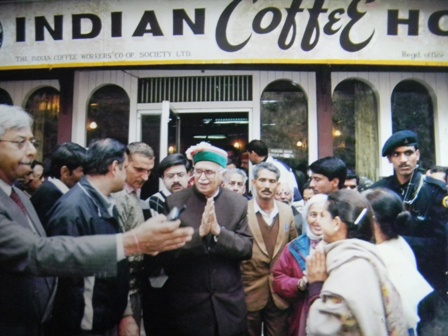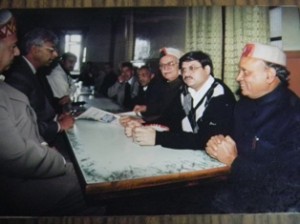
People may come and people may go but the coffee here is ever inviting and the setting has lasted a generation. Chat room, scandal, legal intricacies, rumor, scribes stories, politics, debate, conspiracies — all are discussed and some are even hatched here. It is the good old Indian Coffee House, a landmark eating and meeting place on The Mall that has been so since 1957.
Surviving among tough times when The Mall Road is facing a virtual invasion by multi-national companies, the humble cooperative working model of Indian Coffee House has survived.
Only a worker can be a member of this society,†says Kalam Singh Rana, the manager of the good old café. And membership is only granted after five years of service in the coffee house, he adds.
It was in an hour of crisis that the institution was born. Due to restructuring of the Central Coffee Board in the late 1950’s, retrenchment stared onto the livelihoods of workers.
An appeal to the then Prime Minister Jawahar Lal Nehru culminated in starting of coffee houses that were to be owned, run and managed by the workers themselves as cooperatives. The first such one was opened near Kraori Mall College in Delhi and was soon followed up by opening twelve other branches at Chandigarh, Ludhiana, Jaipur, Allahabad, Dharamshala and Shimla.
Recounting the history Rana said “the founder members of the society pawned their wife’s jewellery to start these coffee houses.
Registered at Delhi, the society has a membership strength of over 300 and a worker strength of 400, this cooperative provides a secure livelihood for many.
Not all of our coffee houses are profitable but whatever earnings exceed in terms of turnovers are passed to the workers as a salary increase†says Rana.
Chamba Mal who helped in establishing the coffee house in Shimla and also helped them to buy prime property on The Mall Road was denied membership of the society.
“I could not become a member as the very people I helped turned down my application on the grounds that rules provided that only workers could become members. I was in business,†says Chamba Mal.
A new recruit begins his internship as a scullion who washes dishes. On promotion he becomes man general, pantry man, supervisor, table boy and then bearer.
People from all communities and all regions are part of the work force. The uniform with the traditional headgear has been bearer dress since the Raj days.
The coffee house which occupies three floors of a seven storied building and is owned by the society is a property worth several crores today. In 1968, this prime property was bought for Rs 85,000/-.
“Even though food inflation is very high, we have tried to maintain the quality of the coffee over the years. It is far far cheaper than the coffee served in other restaurants and the upmarket coffee shops on The Mall,†said Rana.
Struggling careers and rising politicians have often fallen back on the trusted eating place to and used it to get noticed, but once they go places few bother to look back. Whenever in Shimla, some however, make it a point to visit The Indian Coffee House.
As Editor, Ravinder Makhaik leads the team of media professionals at Hill Post.
In a career spanning over two decades through all formats of journalism in Electronic, Print and Online Media, he brings with him enough experience to steer this platform. He lives in Shimla.




